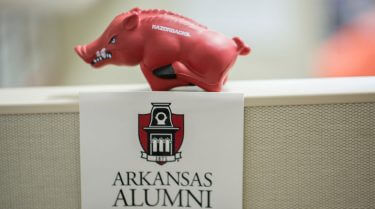
Grocery shopping wasn’t always so difficult for Anita Walker. “When I was in college, I would just shop and I really wouldn’t pay attention,” says the 24-year-old category development analyst in Hormel Foods Cincinnati sales office. “Now my mom and my cousins say, ‘We can’t go to the store with you because you just analyze everything!’ Well, that’s just my job! I need to know everything.”
Like many young people, Walker’s shopping patterns were set by what she ate growing up in Little Rock, Arkansas. “I just followed what my parents bought,” says Walker. “So if my mom bought Hormel® chili, I was going to buy Hormel® chili.”
Listening Matters
Listening skills played a part in Walker’s first encounter with Hormel Foods. When she was at the University of Arkansas, majoring in retail merchandising with an emphasis on accounting, she had an internship in the packaged meats department at Walmart. “I remember when Stack Pack Premium Flavored Bacons were being introduced and they were rolling them out to Walmart,” says Walker. “The Hormel Foods sales representative was really interested in my opinion about what millennials think about these products and flavors,” Walker says. “She was one of the only people who was interested in what I thought. She had a really good relationship with my buyer and my buyer would always speak highly of her.”

It wasn’t long after that Walker started planning her career. “I wanted to work with something I’m familiar with,” she says. “I went into my pantry to see who makes what.” She remembers being shocked to find how many of the products in her own kitchen came from Hormel Foods. “Then I started going on websites and applying.”
She liked the “day in the life” videos the company posted, which helped her get a sense of the company culture. “I also looked up some articles and saw it was a promote-from-within company,” she says. “I really liked that.”
She agrees that many people her age aren’t thinking long term when it comes to work. “I do know multiple people on their second or third job already,” she says. “It depends on your situation. I personally feel that if a company embraces millennials and makes them feel that they can have a successful career within that company, they would stay.”
A New Base
Hormel Foods is Walker’s first employer and if she (and the company) are lucky, it may be her last. “This is literally my first time living outside the state of Arkansas,” she says. “I just packed up the U-Haul and drove to Ohio. My mom was really excited about it. My mom is disabled and she kind of wants me to break away. I always worry about her, but she’s always saying, ‘No, you need to go and have your own life.’”
Co-workers at Hormel Foods were eager to give her tips about where to live and what to do when she relocated. “I’m not a beer drinker,” she says, “and in Arkansas we didn’t really have breweries, but here in Cincinnati it’s all about the beer and different breweries!” On weekends she will hit some of the city’s hot spots with her sorority sisters (Alpha Kappa Alpha has a graduate chapter in Cincinnati) and go bowling or to the movies, and, well, tour a few breweries. (Samples are involved.)

As an African-American woman, Walker is mindful of racial diversity in the workplace. “We have multiple ERGs [employee resource groups], including one for African-Americans. There’s one for women called Women Our Way and one for LGBTQ people as well. Using our ERGs is one way to continue evolving the view of Hormel Foods.”
Walker says she is too engaged by her job to even think of leaving. Working with the data service 84.51°, she analyzes what shoppers are buying and why they return to certain products. “In a nutshell, I take shopper loyalty card data and turn it into insights to help our sales and marketing teams.”
Home Cooking
Walker has been trying to cook a wider variety of dishes at home lately, even making stuffed chili quinoa peppers from a recipe she found online. But she never forgets where she came from. “I do a lot of Southern comfort food cooking: fried chicken, cornbread, sweet potatoes, mac and cheese,” she says. “That’s the good stuff.”
Her short-term goal is to become her division’s training manager. “I had a very difficult upbringing and I did it all on my own,” she says. “I’m a first-generation college student, so I know what it’s like to have difficult times and see your way through them. If I can help anybody in any way get through a situation, then I want to give back and help.”

